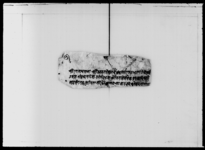A purjī from Garuḍadhvaja Pā̃ḍe ordering the provision of wheat to Rājavīra (VS 1878)
ID: E_2778_0006
Edited and
translated by Surabhi Pudasaini
in collaboration with
Pabitra Bajracharya
Created: 2022-07-19;
Last modified: 2022-12-31
For the metadata of the document, click here
The accompanying edition, translation/synopsis and/or commentary are available under the terms of the Creative Commons Attribution-ShareAlike 4.0 International License
Abstract
This purjī from the kaparadāra Garuḍadhvaja Pā̃ḍe orders the aḍais Rājabala Ḍoṭyāla and Ramānātha Pādhyā to provide wheat to one Rājavīra, who was serving inside the royal palace.Diplomatic edition
[1r]
1⟪6⟫1⟪[?]⟫1श्री\1अडैरमानाथपाध्या•अडैराजवलडोट्यालकेश्रीकपर्दारगरुडध्वजपाँडेकोपुर्जि2उप्रांत•भीत्रकापट्टिमा•राजवीरभन्याकोलेषनविर्सियेछ•दुइछाकिकाहि
3सावसंगगहुमुरी१।१०भरिदेउ[?]सालआषाडवदि१रोज२शुभ्म्¯¯¯ ¯¯¯ ¯¯¯ ¯¯¯ ¯¯¯ ¯¯¯ ¯¯¯ ¯¯¯
Translation
[1r]
6
To AḍaiRamānātha Pādhyā [and] Aḍai Rajabala Ḍoṭyāla. A purjī from Śrī KaparadāraGaruḍadhvaja Pā̃ḍe. Uprānta: It was forgotten to write the person called Rājavīra [who serves] inside [the palace]. Disburse 1 murī, 10 [pāthīs] of wheat [for him], reckoned at two meals [per day].
Monday, the 1st of the dark fortnight of Āṣāḍha in the [Vikrama] era year [1878] (1821 CE). May it be auspicious.
Commentary
This is a note from the kaparadāra Garuḍadavaja Pā̃ḍe ordering two aḍais to provide wheat to Rājavīra, who was serving ‘inside’ the royal palace (likely in the living areas). The order is a follow-up to a previous, currently unavailable, document, in which Rājavīra was accidentally left out of. Rājavīra is to receive wheat reckoned to be adequate for two meals per day, doubling the 15 pāthīs granted to those eligible only for one meal.
This is one of ten documents (E_2778_0001 to E_2778_0010) recording the distribution of wheat to various people who worked within the Hanumānḍhokā palace complex. All the orders date to VS 1878 and relate to the wheat crop of Lubhuserā land in that year. This note differs from the rest in lacking the formulaic line confirming that the deductions in the accounts corresponding to this addition would take place when the ledgers were submitted for control (bahī bujhdā mojarā parla).
Savāla 3 of RRC_0024_0776, laying out Bhoṭu Pā̃ḍe’s duties as kaparadāra in VS 1859, confirms that the kaparadāra was responsible for ascertaining the amount of foodgrains that palace servants received. Garuḍadhvaja Pā̃ḍe appears to be fulfilling that duty here. The ten directives were issued over the course of three months from Jeṭh to Bhadau. Ascertaining the amount of foodgrains that individual palace servants received was, therefore, not a task concluded in parallel. Rather, the amounts were reviewed and confirmed serially.
Garuḍadhvaja was kaparadāra from the early VS 1870s till the early 1890s. He was a son of the former kaparadāra Bhoṭu Pā̃ḍe (see Pā̃de Chetrī 1977: 246). Though the authority to ascertain amounts rested with the kaparadāra, the orders were carried out by two aḍais, Rājabala Ḍoṭyāla and Ramānātha Pādhyā. Aḍais were employed at the Koṭa Bhaṇḍāra, which managed the stores of foodstuffs within the royal palace complex. Each serā was also put under the management of one or a pair of aḍais.1 Outside the current ten documents, Rājabala Ḍoṭyāla appears again in relation to Lubhu serā [land] in VS 1880 in E_2764_0046.

